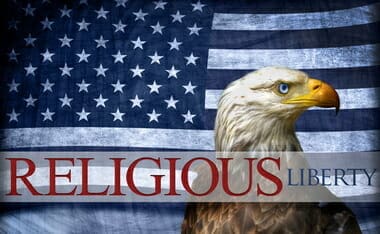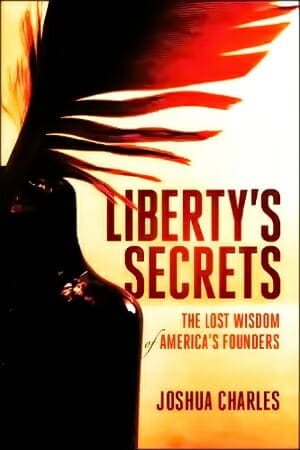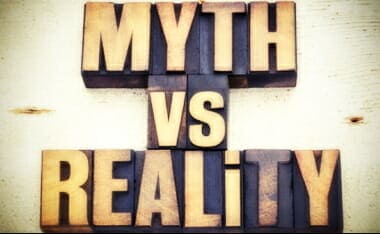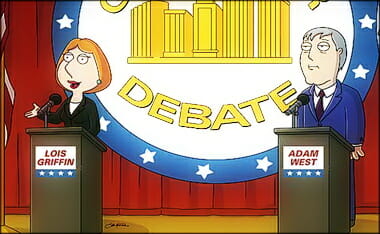What corrupts politics more: Millionaires and billionaires? Or the rules that intend to limit the influence of wealthy donors? George Will, author and Pulitzer Prize-winning columnist for the Washington Post, explains who designed campaign finance reform and why Congress’s solution to the problem may actually be the bigger problem.
Month: November 2015


Liberty’s Secret ~ Excerpt
I have already been challenged on this topic, to wit, the challenge and my response will follow the excerpt.
This following excerpt from Liberty’s Secrets is one that squarely displaces the typical secular attack on Jefferson being a man of faith to some degree. In this excerpt Thomas Paine’s position on Christianity and God is dealt with as an extra bonus, as well as some of the Founders predictions of the then young French Revolution. This is a really good read, and I highly recommend the book.
Before the excerpt, I want to share a favorite sentence that I think best defines the Founders accomplishments in the Constitution. Here it is:
- The Constitution is the integration of ideals with reality, the ideal being human liberty, the reality being human nature. (p. 69)
If that isn’t the best definition in one sentence of the Constitution, I don’t know what is!
GOD AND THE HUMAN SOUL: THE EXISTENCE OF THE UNIVERSE AND MORALITY
Belief in God and the immortality of the human soul was universal among the Founders, which is incontrovertibly evident from the most cursory review of their writings. While not all of them were orthodox Christians, their thoughts on atheism ranged from extreme caution to outright disdain. For them, belief in God was natural to man because it was in accordance with his nature, and they agreed with Tocqueville when he noted (while describing the virtual absence of atheism in America) that “men cannot detach themselves from religious beliefs except by some wrong-headed thinking, and by a sort of moral violence inflicted upon their true nature… Unbelief is an accident; faith is the only permanent state of mankind.”
They saw the fingerprints of God everywhere they looked, and their conclusion that He existed was not even necessarily dependent on the Bible or any specific set of religious dogma but on the very nature of the cosmos. Writing to his friend John Adams toward the end of his life, Jefferson explained his views:
I hold (without appeal to revelation) that when we take a view of the Universe, in its parts general or particular, it is impossible for the human mind not to perceive and feel a conviction of design, consummate skill, and the indefinite power in every atom of its composition… We see, too, evident proofs of the necessity of a superintending power to maintain the Universe in its course and order… So irresistible are these evidences of an intelligent and powerful Agent that, of the infinite numbers of men who have existed through all time, they have believed, in the proportion of a million at least to unit, in the hypothesis of an eternal pre-existence of a creator, rather than in that of a self-existent Universe. Surely this unanimous sentiment renders this more probable than that of a few in the other hypothesis Even Thomas Paine, who in the second half of his life was an ardent opponent of orthodox Christianity (mostly Catholicism) and the clergy and did not believe the Bible was divinely inspired, wrote at the same time, “All the principles of science are of divine origin. Man cannot make or invent or contrive principles. He can only discover them, and he ought to look through the discovery to the Author.”
Paine criticized any teaching of “natural philosophy” (i.e., science) that asserted that the universe was simply “an accomplishment” (i.e., self-existent). He also criticized those teachers who “labor with studied ingenuity to ascribe everything they behold to innate properties of matter and jump over all the rest by saying that matter is eternal” and thereby encouraged the “evil” of atheism. “Instead of looking through the works of creation to the Creator Himself, they stop short and employ the knowledge they acquire to create doubts of His existence,” he lamented. “When we examine an extraordinary piece of machinery, an astonishing pile of architecture, a well-executed statue, or a highly-finished painting… our ideas are naturally led to think of the extensive genius and talent of the artist. When we study the elements of geometry, we think of Euclid. When we speak of gravitation, we think of Newton. How, then, is it that when we study the works of God in creation, we stop short and do not think of God?”
For these reasons, among others, Jefferson rejected being an atheist, “which,” as he put it, “I can never be.” His friend John Adams noted, “I never heard of an irreligious character in Greek or Roman history, nor in any other history, nor have I known one in life who was not a rascal. Name one if you can, living or dead.”” Nor did the Founders see science and religion as opposed to one another, as is all too common today. Rather, as President Adams asserted in a letter to university students, they were not only mutually compatible, but mutually necessary for one another: “When you look up to me with confidence as the patron of science, liberty, and religion, you melt my heart. These are the choicest blessings of humanity; they have an inseparable union. Without their joint influence no society can be great, flourishing, or happy.”
Just as much as the existence of God was essential to their understanding of the physical constitution of the universe, its combination with their belief in the immortality of the soul was crucial to their understanding of the moral constitution of the world, as it was the means by which God judged the good and evil acts committed in this life, whether noticed by man or not. Tocqueville ascribed a great deal of the accomplishments of the Puritans/Pilgrims and their progeny (the Founders) to this belief, which he described as so “indispensable to man’s greatness that its effects are striking,” for it kept him morally anchored, never able to escape ultimate justice. It was for this reason that the Founders considered belief in God as the cornerstone of all morality, but not because man could do no good apart from God commanding him to do so. Quite the contrary: part of their conception of the “law of nature and nature’s God” was the idea that all men had at least portions of this law inscribed into their very being, and that most men knew the basics of right and wrong because God had given them a conscience. The problem was that, because of their fallen nature, they did not obey their consciences as they should. Adams elaborated:
The law of nature would be sufficient for the government of men if they would consult their reason and obey their consciences. It is not the fault of the law of nature, but of themselves, that it is not obeyed; it is not the fault of the law of nature that men are obliged to have recourse to civil government at all, but of themselves; it is not the fault of the ten commandments, but of themselves, that Jews or Christians are ever known to steal, murder, covet, or blaspheme. But the legislator who should say the law of nature is enough, if you do not obey it, it will be your own fault, therefore no other government is necessary, would be thought to trifle.
This brings us to a very important fact that we must remember when it comes to the Founders: they did not believe that religion made men good, but rather that it provided the best encouragement and incentive to be good, for it taught them that their choices had consequences in eternity, not just in the moment. Even if consequences could be avoided in the now, God would exact justice in the hereafter.
This had been a Judeo-Christian teaching from time immemorial and was well known to the Founders. The problem was not that man had no knowledge of good and evil and therefore needed a religious commandment to tell him, but rather that human nature commonly bowed to the dictates of the passions, rather than reason, and thereby abandoned conscience and committed evil anyway. The Founders realized that our human nature could, and often did, pervert the plain dictates of conscience, allowing us to convince ourselves that right is wrong and wrong is right if it suits our own desires. As Adams noted, “Human reason and human conscience, though I believe there are such things, are not a match for human passions, human imaginations, and human enthusiasm.” Our passions would corrupt our minds, our minds would justify our passions, and in turn our passions would become even more corrupt, a deadly cycle with horrific consequences for individuals and society. “Our passions, ambition, avarice, love, resentment, etc. possess so much metaphysical subtlety and so much overpowering eloquence that they insinuate themselves into the understanding and the conscience and convert both to their party,” Adams wrote. “And I may be deceived as much as any of them when I say that power must never be trusted without a check.”
That “check,” at least as far as voluntary self-restraint was concerned, was religion. The Founders understood that mankind’s capacity for self-delusion was boundless; therefore, moral obligations must be placed on a divine rather than a humanistic footing if anyone could assert any truth or notion of right and wrong at all. It was for this reason that religious commandments such as “do not murder,” “do not steal,” and “do not commit adultery” were necessary, not because man was completely incapable of avoiding these sins without God commanding him to, but because, since He had commanded them, man had no intellectual excuse for ever allowing his passions or personal desires to blind his judgment and excuse him of his moral obligations. Religion thus anchored the definition of morality on God and asserted its obligations on man by acting as a powerful regulator of the inherently negative aspects of human nature. James Madison explained the importance of this truth: “The belief in a God All Powerful wise and good, is so essential to the moral order of the world and to the happiness of man, that arguments which enforce it cannot be drawn from too many sources nor adapted with too much solicitude to the different characters and capacities to be impressed with it.”
Adams asserted the same thing and specifically acknowledged that Judaism, through the Bible, had bequeathed to the world what he considered the most essential ingredient of human civilization:
I will insist that the Hebrews have done more to civilize men than any other nation. If I were an atheist, and believed in blind eternal fate, I should still believe that fate had ordained the Jews to be the most essential instrument for civilizing the nations. If I were an atheist of the other sect, who believe or pretend to believe that all is ordered by chance, I should believe that chance had ordered the Jews to preserve and propagate to all mankind the doctrine of a supreme, intelligent, wise, almighty sovereign of the universe, which I believe to be the great essential principle of all morality, and consequently of all civilization.
For the Founders, the most effective catalyst of virtue was religion, for it reminded man that he is not God and he therefore cannot shape morality according to his own selfish desires. It was the subversion of this principle that they identified as the cause behind the American and French Revolutions taking such radically different courses: it was ultimately a difference of theology.
GOD AND THE AMERICAN AND FRENCH REVOLUTIONS
The Founders believed in the existence of a God, which they deemed the most rational basis for the existence of the universe, morality, and reason itself. The French Revolution was predicated on almost the exact opposite idea.
While many today assume that the notion of blind chance being the operative force in the universe’s creation and development arrived on the scene with Charles Darwin, this is not the case. In fact, it was a notion quite popular among many of the continental European intellectuals of the time, most of whom were French, and most of whom tended to be atheists and/or materialists (which were practically the same). They contended that the universe had not been created but had either existed eternally or was the result of inherent properties in matter itself. But among the French intelligentsia, the one who had the most profound effect on the Founders, Montesquieu, directly contradicted this position in his famous work, The Spirit of the Laws: “Those who have said that a blind fate has produced all the effects that we see in the world have said a great absurdity,” he wrote, “for what greater absurdity is there than a blind fate that could have produced intelligent beings?”
For Montesquieu and the Founders, the universe was simply too full of information, order, and harmony to ascribe it to blind chance. “What is chance?” asked Adams. “It is motion; it is action; it is event; it is phenomenon without cause. Chance is no cause at all; it is nothing.”
In addition to their denial, or at least extreme doubt of the existence of a Creator, many of the French intellectuals in like manner either doubted or denied the existence and immortality of the human soul. They therefore denied the two theological pillars upon which the Founders based their ideas of virtue, and as such, it was no surprise that the French Revolution, which claimed to be the heir of the American Revolution, devolved into a bloodbath of violence and oppression unrestrained by any religious principle.
While both revolutions were similar in their assertion of human rights, they offered fundamentally different explanations of the origin of such rights. The American Revolution was premised on men being “endowed by their Creator with certain unalienable rights,” while the French Revolution asserted man’s rights were based purely on reason, apart from any notions of divinity or religion. A statue of a deified “Reason” was erected in the Notre Dame cathedral in Paris, and the revolution was predicated upon principles that were explicitly and directly opposed to religion, Christianity in particular. Adams noted the differences between the two revolutions when he wrote to his friend Richard Price that “Diderot and D’Alembert, Voltaire and Rousseau,” all French atheists and materialists, “have contributed to this great event more than Sidney, Locke, or Hoadly,” English political philosophers who explicitly asserted that the “laws of nature and nature’s God” were the foundation of man’s rights and moral obligations, and who had a profound impact on the American Revolution. The French, on the other hand, based man’s rights on the consensus of “the nation.” The rights of man were what man, through the nation, had decided they would be. For this reason, Adams admitted to Price as early as 1790, “I own to you, I know not what to make of a republic of thirty million atheists,” and he predicted there would be rampant violence and bloodshed.
But that was not all. Several of the Founders, Adams in particular, believed that the principles of the French Revolution not only directly undermined the basis of human rights and obligations but also destroyed the very idea of human liberty. If man was simply matter in motion, then his entire destiny had already been determined by physical laws and constants (today known as “determinism”), making liberty a meaningless idea. And yet, this was the view of many of the leading French intellectuals. “And what was their philosophy?” Adams inquired:
Atheism—pure, unadulterated atheism…. The universe was matter only, and eternal. Spirit was a word without a meaning. Liberty was a word without a meaning. There was no liberty in the universe; liberty was a word void of sense. Every thought, word, passion, sentiment, feeling, all motion and action was necessary [determinism]. All beings and attributes were of eternal necessity; conscience, morality, were all nothing but fate. This was their creed, and this was to perfect human nature, and convert the earth into a paradise of pleasure… Why, then, should we abhor the word “God,” and fall in love with the word “fate”? We know there exists energy and intellect enough to produce such a world as this, which is a sublime and beautiful one, and a very benevolent one, notwithstanding all our snarling; and a happy one, if it is not made otherwise by our own fault.
Alexander Hamilton, who described the French Revolution as “the most cruel, sanguinary, and violent that ever stained the annals of mankind,” also predicted its failure due to the fact that it was explicitly
opposed to Christianity, “a state of things which annihilates the foundations of social order and true liberty, confounds all moral distinctions and substitutes to the mild and beneficent religion of the Gospel a gloomy, persecuting, and desolating atheism:’
It was precisely because the French Revolution rejected the Judeo-Christian notion of the fallen nature of man in exchange for the idea that he could be perfected by reason that they engaged in the wanton violence and cruelty of the guillotine: it was all worth it because they were creating a new, ideal world that had to be purged of its impure elements.
The French Revolution was thereby founded on principles that fundamentally contradicted the divine basis of the existence of the universe, man’s rights, his moral obligations, and his very liberty, upon which the Founders, partaking of both the classical and Judeo-Christian tradition, asserted them. With God removed, several of the Founders, Adams in particular, predicted the French Revolution would operate according to the bloody principles of “might makes right.” “A nation of atheists,” he had warned, would likely lead to “the destruction of a million of human beings.” Adams explained his prophecy of a forthcoming deluge of blood in biblical terms and ascribed it to the utter rejection of religion by the leaders of the French Revolution:
The temper and principles prevailing at present in that quarter of the world have a tendency to as general and total a destruction as ever befell Tyre and Sidon[,] Sodom and Gomorrah. If all religion and governments, all arts and sciences are destroyed, the trees will grow up, cities will molder into common earth, and a few human beings may be left naked to chase the wild beasts with bows and arrows…. I hope in all events that religion and learning will find an asylum in America.
In this, he disagreed (at the time) with Jefferson. But even Jefferson was forced to admit decades later, after the Reign of Terror, the Napoleonic Wars, and the other violent outbursts that came out of the French Revolution, that Adams had been completely right in his assessment, acknowledging, “Your prophecies… proved truer than mine.” When Jefferson asked Adams why he had predicted what he did, Adams explained that the power of God had been replaced by the arrogant, usurping power of man, and conscience was thereby disconnected from its transcendent anchors. Thus, those in power believed whatever they did was moral: “Power always sincerely, conscientiously, de tres bon foi [“in very good faith”], believes itself right. Power always thinks it has a great soul, and vast views, beyond the comprehension of the weak, and that it is doing God’s service, when it is violating all his laws.” It was for this reason that, as much as religion had been abused for centuries in European history, Adams argued it could not compare with the atrocities committed in the name of “Liberté, Egalité, Fraternité” during the French Revolution: “It is a serious problem to resolve whether all the abuses of Christianity, even in the darkest ages when the Pope deposed princes and laid nations under his interdict, were ever so bloody and cruel, ever bore down the independence of the human mind with such terror and intolerance, or taught doctrines which required such implicit credulity to believe, as the present reign of pretended philosophy in France.”
As president, Adams had to deal directly with the revolutionary French government and easily noted the difference between an American society that assented to general religious principles and a French society that rejected them:
You may find the moral principles, sanctified and sanctioned by religion, are the only bond of union, the only ground of confidence of the people in one another, of the people in the government, and the government in the people. Avarice, ambition, and pleasure, can never be the foundations of reformations or revolutions for the better. These passions have dictated the aim at universal domination, trampled on the rights of neutrality, despised the faith of solemn contracts, insulted ambassadors, and rejected offers of friendship.
For the Founders, the purpose of reason—which Adams referred to as “a revelation from its maker” and Jefferson as an “oracle given you by heaven”-was to better align human actions with the “law of nature and nature’s God” by the taming of human passions and the application of knowledge. The leaders of the French Revolution believed precisely the opposite, that God didn’t really exist (and if He did, He was largely irrelevant), and that reason was man’s alone, and thus his to utilize toward whatever ends he himself determined. Though the Founders knew perfection “falls not to the share of mortals,” the French believed that man could be perfected through reason, and therefore any barriers to creating the world of their dreams needed to be destroyed, for this was tantamount to obstructing man’s perfection. The differences between the two revolutions thus turned out to be theological at root, and for this reason, while on the surface they were superficially similar, they were in fact fundamentally different, as Adams prophesied, other Founders criticized, and the facts of history verified.
Joshua Charles, Liberty’s Secrets: The Lost Wisdom of America’s Founders (Washington, DC: WND Books, 2015), 82-91.
Dennis Prager interviews Ann Coulter in regards to her new book, Demonic.” Ann points out a fact I wasn’t aware of in regards to the mob mentality that set the standard for the French Revolution. Much like the misunderstanding in regards to the Crusades, the witch trials, and the like, numbers are not the forte of the left. Nor is putting into context meaning behind them.
Challenges
I posted a link to this at a friends “counter-atheist” page on FaceBook. I posted the following that included a link back to this page:
For those interested, before I head out to drink wine in Cambria, I posted an excerpt from a book I am reading… and it deals with both Jefferson’s, Madison’s, Hamilton’s, Paine’s, view of faith and/or atheists and creation vs. evolutionary thinking (the basis of which reaches back to Greece)
Almost immediately after this was posted this was posted.
- Fascinating!! I never knew Jefferson died before The Origin of Species was written!!
I believe Tim, the author of the above challenge, meant to say “died after” Darwin’s seminal work, not before.
Per the modi operandi of the atheists on this site, they do not read and inculcate what was said. Forgive me as I take time with a though. After reading four books on marijuana addiction and the latest studies (one that followed over a thousand people for 25-years) showing the deleterious affects of this drug (a 8% decrease of the amygdala, and 12% reduction in size of the hippocampus). During this time of reading, a story came out about what amounts to brain damage in a controlled setting by “targeted magnetism” — making more people unable to “believe” in God… by about thirty-percent.
One commentator said it must be embarrassing to the atheist because “the specific part of the brain they frazzled was the posterior medial frontal cortex—the part associated with detecting and solving problems, i.e., reasoning and logic.”
I often wonder aloud to my wife if these guys smoke weed! But I digress… continuing.
I respond:
I am sorry Tim, evolutionary thinking pre-dates Darwin. Take Cicero countering his rivals of the day (as an example). If you read this… what is the opposing viewpoint? [Nothing?]
…suppose that after darkness had prevailed from the beginning of time, it similarly happened to ourselves suddenly to behold the light of day, what should we think of the splendour of the heavens? But daily recurrence and habit familiarize our minds with the sight, and we feel no surprise or curiosity as to the reasons for things that we see always; just as if it were the novelty and not rather the importance of phenomena that ought to arouse us to inquire into their causes.
Marcus Tullius Cicero, Cicero Nature of the Gods Academics (Cambridge, MA: Harvard University Press; Translated by H. Rackam, 2005), 217.
OR,
But if the structure of the world in all its parts is such that it could not have been better whether in point of utility or beauty, let us consider whether this is the result of chance, or whether on the contrary the parts of the world are in such a condition that they could not possibly have cohered together if they were not controlled by intelligence and by divine providence. If then the products of nature are better than those of art, and if art produces nothing without reason, nature too cannot be deemed to be without reason. When you see a statue or a painting, you recognize the exercise of art; when you observe from a distance the course of a ship, you do not hesitate to assume that its motion is guided by reason and by art; when you look at a sun-dial or a water-clock, you infer that it tells the time by art and not by chance; how then can it be consistent to suppose that the world, which includes both the works of art in question, the craftsmen who made them, and everything else besides, can be devoid of purpose and of reason? Suppose a traveller to carry into Scythia or Britain the orrery recently constructed by our friend Posidonius, which at each revolution reproduces the same motions of the sun, the moon and the five planets that take place in the heavens every twenty-four hours, would any single native doubt that this orrery was the work of a rational being? These thinkers however raise doubts about the world itself from which all things arise and have their being, and debate whether it is the product of chance or necessity of some sort, or of divine reason and intelligence;
Marcus Tullius Cicero, Cicero Nature of the Gods Academics (Cambridge, MA: Harvard University Press; Translated by H. Rackam, 2005), 207-209.
And the opening sentence to a Berkeley.EDU paper is this:
✦ Evolutionary theory begins with the Ionian philosopher Anaximander (ca. 611 – 546 B. C. E.). Very little is known about his life, but it is known that he wrote a long poem, On Nature, summarizing his researches. This poem is now lost, and has survived only in extracts quoted in other works. Enough survives, however, that Anaximander’s thought can be reconstructed with some confidence. For Anaximander, the world had arisen from an undifferentiated, indeterminate substance, the apeiron. The Earth, which had coalesced out of the apeiron, had been covered in water at one stage, with plants and animals arising from mud. Humans were not present at the earliest stages; they arose from fish. This poem was quite influential on later thinkers, including Aristotle. ~ Berkeley.edu
Tim responds:
- What’s your point?
This is one of those “bang your head on the keyboard” moments. You see, Tim challenged my statement. I corrected his challenge. He then feigns like I just waded in, off topic. Like I started talking about MPG for city buses where I live. You will notice this is Paley’s watchmaker argument almost 1800-years before Paley lived! Paley pre-dated Darwin. Were there no naturalistic origins hypothesis of his day either? Paley was just “preaching to the quire”? Dumb. Here is my response:
OMG…. sigh….
➣ You said: “Fascinating!! I never knew Jefferson died [after] The Origin of Species was written!!”
I corrected your viewpoint that “evolution” is something Charles Darwin “founded.” He merely reformulated the general idea that “man has evolved,” into, the General Theory of Evolution (GTE).
For more context on defining “evolution,” see my debate with some atheists about the General Theory of Evolution.

L.A. City Controller Says Turf Removal Wasteful
Here is the story in part via the Los Angeles Times:
Los Angeles’ turf rebate program saved less water per dollar spent than other Department of Water and Power conservation programs, an audit released by the city controller said Friday.
Auditors found that money spent for rebates on items such as high-efficiency appliances yielded a water savings almost five times higher than turf replacement. They also found that the DWP does not prioritize water conservation projects based on which are the most cost-effective.
City Controller Ron Galperin called on the water provider to focus its conservation programs in order to achieve more sustained and cost-effective water savings.
“If money is no object, turf replacement rebates are a relatively expedient way to save water,” Galperin said. “But, of course, money is an object.”
In fiscal year 2014-15, the DWP spent $40.2 million on customer incentive and rebate programs, Galperin’s office said. Nearly $17.8 million of that went to turf rebates. Each dollar invested in turf rebates is expected to save 350 gallons of water over the estimated 10-year “life expectancy” of residential turf replacement, the audit said.
In comparison, the department spent $14.9 million on rebates for high-efficiency appliances and fixtures. Those rebates yield a per-dollar savings of more than 1,700 gallons of water over their estimated lifetimes of up to 19 years, Galperin’s office said.
The turf rebate program “had value as a gimmick that … probably spurred a heightened awareness,” Galperin said at a news conference, adding: “It’s the job of my office to look at return on investment.”…
When the government of L.A., or for that matter our one party state, uses tax-payer monies… “money is no object.” The California boondoggles of solar power and trains come to mind. Or even the Democrats teaming up with eco-fascists to create water shortages! (See the “drought” posts here)

A Reminder Of The Peaceful Religion Being “Peaceful”
The shocking story comes via Jihad Watch:
This is the moment a father-of-six was battered by hooded thugs with a pickaxe in an attack he claims was sparked by his move from Islam to Christianity.
Nissar Hussain, 49, suffered a shattered knee cap and broken hand when he was attacked outside his home in what police are treating as a religious hate crime.
He was hit 13 times with a pickaxe and repeatedly punched and kicked when the two attackers leapt upon him from a car as he left his house in Bradford, West Yorkshire.
But now Mr Hussain claims the savage beating was the result of his move away from Islam, and says him and his family have been forced to live “under a climate of fear”.
Mr Hussain, a nurse, said he became a target after he converted to Christianity in 1996 and his family appeared in a Channel 4 TV documentary about mistreatment of Muslim converts in 2008.
[….]
“I think multiculturalism has failed, I think David Cameron’s Big Society has failed and I think there is two laws, one for them and one for us.”…
A hadith depicts Muhammad saying:
- “Whoever changed his Islamic religion, then kill him” (Bukhari 9.84.57).
The death penalty for apostasy is part of Islamic law according to all the schools of Islamic jurisprudence. This is still the position of all the schools of Islamic jurisprudence, both Sunni and Shi’ite. Sheikh Yusuf al-Qaradawi, the most renowned and prominent Muslim cleric in the world, has stated:
“The Muslim jurists are unanimous that apostates must be punished, yet they differ as to determining the kind of punishment to be inflicted upon them. The majority of them, including the four main schools of jurisprudence (Hanafi, Maliki, Shafi`i, and Hanbali) as well as the other four schools of jurisprudence (the four Shiite schools of Az-Zaidiyyah, Al-Ithna-`ashriyyah, Al-Ja`fariyyah, and Az-Zaheriyyah) agree that apostates must be executed.”

Sharyl Attkisson ~ “Obama Won’t Read Reports on Terrorist Groups”
Via The Blaze

Footage From A French Cafe During Shooting
The video is via The Daily Mail. The Blaze points out that some women out in front of the cafe had a miraculous intervention:
- A particularly chilling moment in the video appeared to show the Islamist gunman aim his AK-47 point blank at a woman hiding under an outdoor table. After trying to fire unsuccessfully – either because the gun jammed or ran out of ammunition – the gunman walked away, allowing the woman to escape.
Wow.

Conversations with Lemmings: Did God “Create” Evil (Isaiah 45:7)
I won’t get into the long back-and-forth that preceded this exchange. As much as I am confident it shows my own close attention to giants of thinkers that p[receded me as well as the clarity of the theistic position and the inherent implausibility and self-refuting nature of atheism… you can go to the discussion yourself and decide (you would have to be on FaceBook and “like” the group this took place in for the link to work).
Here Daniel said the following:
God being all powerful could have just as easily not created evil and permitted us free will. I am not able to imagine that which is impossible yet I still possess free will. Evil could have just as easy been one of the things I can not comprehend. Your argument is incredibly flawed.
[….]
Notice how I put came to be in “”. It’s simply referring to him being perfect from the get go from the beginning to forever. Never changing perfectly complete in every aspect. Never in need of anything.
I’m talking perfection not your flimsy anthropomorphic idea.
To which I respond in part:
He didn’t create evil. And in a previous post elsewhere you mentioned God coming into existence. You really should study the classical view of God (from Grecian times to ours). Maybe something like (I am struggling for something basic for you, because you seem not to be lifting with your legs on what I put down), Philosophy for Dummies, by Tom Morris. And, Christianity For Dummies, by Richard Wagner and Kurt Warner. [I didn’t mention this in the conversation, but the best intro to the topic of basic Christian beliefs is a book by theologian Wayne Grudem tiled “Bible Doctrine: Essential Teachings of the Christian Faith“]
Because you say stuff that paints a giant straw-man and this interferes with your conclusion.
- Mortimer J. Adler rightly points out that while many Christians are quick in responding to the conclusions in an argument often times the Christian is unaware that the point of departure is not in the conclusion, but in the starting premise, the foundational assumptions.
Norman L. Geisler & Peter Bocchino, Unshakeable Foundations: Contemporary Answers to Crucial Questions About the Christian Faith (Minneapolis: Bethany House, 2001), 20-21.
Daniel retorted with…
Again you are wrong. Hold on I’ll be back with the verse….Isaiah 45.7
- I form the light, and create darkness: I make peace, and create evil: I the LORD do all these things.
This verse, ISAIAH 45:7 — for context — reads:
- I form light and create darkness, I make well-being and create calamity, I am the Lord, who does all these things. (ESV)
- I form light and create darkness, I make success and create disaster; I, Yahweh, do all these things. (HCSB)
- The One forming light and creating darkness, Causing well-being and creating calamity; I am the Lord who does all these. (NASB)
- I form light and create darkness, I make harmonies and create discords. I, God, do all these things. (The Message)
Here is the Hebrew:
(Click to enlarge)
Note that Daniel used the KJV, whereas most versions since 1611 translate this word/thought (“and create evil“) better due to communication and modern access to many more manuscripts. Really, the context of the preceding verses should be included… you can read it here. I reference a previous discussion of this person [probably young man] coming at any ancient text with some parameters. He made it clear that his viewpoint is the only one that mattered (implicitly at least).
I responded
I will respond to the verse… it will offer you a great opportunity to be a literary critic… but first, here is a section from Philosophy for Dummies:
ROBOTS AND COSMIC PUPPETRY: THE SCIENTIFIC CHALLENGE TO FREEDOM
Since at least the time of Sir Isaac Newton, scientists and philosophers impressed by the march of science have offered a picture of human behavior that is not promising for a belief in freedom. All nature is viewed by them as one huge mechanism, with human beings serving as just parts of that giant machine. On this view, we live and think in accordance with the same laws and causes that move all other physical components of the universal mechanism.
According to these thinkers, everything that happens in nature has a cause. Suppose then that an event occurs, which, in context, is clearly a human action of the sort that we would normally call free. As an occurrence in this universe, it has a cause. But then that cause, in turn, has a cause. And that cause in turn has a cause, and so on, and so on [remember, reductionism].
- “Everything is determined, the beginning as well as the end, by forces over which we have no control. It is determined for the insect as well as for the star. Human beings, vegetables, or cosmic dust, we all dance to a mysterious tune, intoned in the distance by an invisible player” ~ Albert Einstein.
As a result of this scientific world view, we get the following picture:
- Natural conditions outside our control…
- cause…
- Inner bodily and brain states,
- which cause…
- mental and physical actions
But if this is true, then you are, ultimately, just a conduit or pipeline for chains of natural causation that reach far back into the past before your birth and continue far forward into the future after your death. You are not an originating cause of anything [this includes brain activity of all degrees, that is, love, pain, etc.). Nothing you ever do is due to your choices or thoughts alone. You are a puppet of nature. You are no more than a robot programmed by an unfeeling cosmos.
Psychologists talk about heredity and environment as responsible for everything you do. But then if they are, you aren’t. Does it follow that you can then do as you please, irresponsibly? Not at all. It only follows that you will do as nature and nurture please. But then, nature on this picture turns out to be just an illusory veil over a heartless, uncaring nature. You have what nature gives you. Nothing more, nothing less.
Where is human freedom in this picture? It doesn’t exist. It is one of our chief illusions. The natural belief in free will is just a monstrous falsehood. But we should not feel bad about holding on to this illusion until science corrects us. We can’t have helped it.
This reasoning is called The Challenge of Scientific Determinism. According to determinists, we are determined in every respect to do everything that we ever do.
This again is a serious challenge to human freedom. It is the reason that the early scientist Pierre Laplace (1749-1827) once said that if you could give a super-genius a total description of the universe at any given point in time, that being would be able to predict with certainty everything that would ever happen in the future relative to that moment, and retrodict with certainty anything that had ever happened in any moment before that described state. Nature, he believed, was that perfect machine. And we human beings were just cogs in the machine, deluded in our beliefs that we are free.
(Tom Morris, Philosophy for Dummies, 133-134)
Previously I noted his view of Consciousness was ill-placed:
What merit would attach to moral virtue if the acts that form such habitual tendencies and dispositions were not acts of free choice on the part of the individual who was in the process of acquiring moral virtue? Persons of vicious moral character would have their characters formed in a manner no different from the way in which the character of a morally virtuous person was formed—by acts entirely determined, and that could not have been otherwise by freedom of choice.
Mortimer J. Adler, Ten Philosophical Mistakes (New York, NY: Touchstone, 1985), 154.
At any rate, here is my response to Daniel’s verse he quoted most-probably from an atheist website:
A historian and critic of ancient literature would ask the following questions:
- Who was the writer?
- To whom were they writing?
- Is the choice of words, wording, or word order significant in this particular passage?
- What is the cultural, historical context?
- What was the author’s original intended meaning?
- How did the author’s contemporaries understand him?
- Why did he say it that way?
By doing this one shows a maturity level past taking a verse out of context. And again, you would want to give the benefit of doubt to the document [Aristotle and our court system] with the following:
1) Rule of Definition: Define the term or words being considered and then adhere to the defined meanings.
2) Rule of Usage: Don’t add meaning to established words and terms. Ask what was the common usage in the culture at that time period.
3) Rule of Context: Avoid using words out of context. Context must define terms and how words are used.
4) Rule of Historical background: Don’t separate interpretation from historical investigation.
5) Rule of Logic: Be certain that words as interpreted agree with the overall premise.
6) Rule of Precedent: Use the known and commonly accepted meanings of words, not obscure meanings for which there is no precedent.
7) Rule of Unity: Even though many documents may be used there must be a general unity among them.
8) Rule of Inference: Base conclusions on what is already known and proven or can be reasonably implied from all known facts.
[I discuss the above more in-depth here.]
So, for example, I will post one thought on the matter by CARM:
- “We can see that the Bible teaches that God is pure and does not approve of evil and that the word, rah (evil), in Hebrew can mean many things and that contextually the verse is speaking of calamity and distress. Therefore, God does not create evil in the moral sense but in the sense of disaster or calamity.”
And from Come Reason Ministries:
- “Evil means natural, and not moral evil, or sin. Herderson says ‘affliction, adversity’; Calvin, ‘afflictions, wars, and other adverse occurrences.’ Whichever interpretation may be adopted, none of the above texts, nor any others when properly explained, sanction the revolting proposition that God is the author of sin.”
Take hurricanes as an example. Hurricanes cause havoc, mayhem, and many times death and suffering. Yet, our planet would be dead without them (see my post where similar to you, arguments made against God end up being proof for Him.
So are you being thorough in your studies, knowing that which you refute? or are you being like the masses of uneducated voters/thinkers and just “willy nilly” taking stuff for granted and thinking you have a good argument?
Honorable mentions of resources on this verse:
Did God Create Evil – Does the Bible Say So? (Evidence for God):
Isaiah 45:7 contrasts opposites. Darkness is the opposite of light. However, evil is not the opposite of peace. The Hebrew word translated “peace” is shâlôm,2 which has many meanings, mostly related to the well being of individuals. Râ‛âh,3 the Hebrew word translated “evil” in the KJV often refers to adversity or calamity. There are two forms of the word. Strong’s H7451a most often refers to moral evil, whereas Strong’s H7451b (the form used here) most often refers to calamity or distress. Obviously, “calamity” is a better antonym of “peace” than “evil.”
Why does Isaiah 45:7 say that God created evil? (Got Questions?):
The context of Isaiah 45:7 makes it clear that something other than “bringing moral evil into existence” is in mind.
Here are a few commentaries on the verse[s]:
6. Comfort from Cyrus, God’s Anointed (Chap. 45)
45:1–6 The LORD calls Cyrus His “anointed” (the same word as “messiah” in Hebrew) because the Persian monarch was a prototype of the Messiah who would give final deliverance to His people. Jehovah promises to give him victory over nations, principally Babylon, to remove all hindrances to his conquests, and to hand over to him tremendous amounts of hidden riches in secret places. Still addressing Cyrus, the LORD speaks of Himself as the only true God, who calls Cyrus by name, who surnames him as anointed and shepherd (44:28), and who equips him for his mission. God does all this for the sake of His people, and so that the whole world may know that He alone is the LORD.
45:7 Verse 7 does not mean that God creates moral “evil,” as some have claimed, based on the King James Version and other early translations.
Delitzsch points out that the early “Christian” heretic Marcion, and the heretical Valentinians and other Gnostic sects, abused this text to teach that the God of the OT was “a different being from the God of the New.”
Addressing the problem of evil (including calamity, no doubt), Delitzsch continues, “Undoubtedly, evil as an act is not the direct working of God, but the spontaneous work of a creature endowed with freedom.”
- William MacDonald, Believer’s Bible Commentary: Old and New Testaments, ed. Arthur Farstad (Nashville: Thomas Nelson, 1995), 972.
45:5–7 The Lord’s Witness to Cyrus
In the first stanza (45:5–6a) and from this center-stage position, the Lord continues to address Cyrus with the word I am the LORD. Though Cyrus does not know the Lord (cf. 45:4), the Lord knows Cyrus and equips him. I am using the word equips to refer to all of the ways in which the Lord has strengthened Cyrus (45:1–4). The goal of that equipping was to set the Judean exiles free (45:13). The equipping of Cyrus takes place so that they may know … that there is no one besides me (45:6). It is not clear who they might be. The NIV substitutes the word men, meaning people in general. But this is conjecture. The more likely antecedent for they would be Jacob-Israel (45:4). But why would the Lord’s equipping of Cyrus make it possible for Jacob-Israel to know that there is no one besides the Lord? The answer lies at the end of 45:1–13. Cyrus will permit Jerusalem to be rebuilt; Cyrus will set the Judean exiles free (45:13). Jacob-Israel will know that the Lord has delegated power to Cyrus but that it is the LORD’s power that needs to be reckoned with.
The phrase I am the LORD opened the first stanza and now it opens the second (45:6b–7). This is followed by parallel lines describing the Lord as
forming light and creating darkness,
making peace and creating distress. (45:7 AT)
These lines employ language from Genesis 1 and 2 (forming, creating, making). In the second line the Lord lays claim to making peace as well as creating distress (ra‘). The Hebrew noun ra‘ has a range of meanings (cf. evil, KJV; disaster, NIV; woe, NRSV; calamity, JB). It is a mistake to elaborate a theology of God as the creator of evil from this text (see “Creating Evil” in TLC below).
The main point in the witness to Cyrus in 45:5–7 is the Lord’s singularity (no one else) and his activity (doing all these things). God’s power may be seen in creation and in history. God’s sovereignty is over Cyrus; Cyrus does not control God.
- Ivan D. Friesen, Isaiah, Believers Church Bible Commentary (Scottdale, PA; Waterloo, ON: Herald Press, 2009), 277.
45:5–7. Again the uniqueness of God is stressed. The fact that there is no other is stated in verses 5–6, 14, 18, 21–22 (also see 43:11; 44:6; 46:9). In Cyrus’ day the Lord was not universally acknowledged, but eventually He will be (cf. Phil. 2:10–11). People will realize that all that happens-light (life), darkness (death), prosperity, and disaster (not “evil” as in the KJV; cf. Amos 3:6)—comes from God. As the sovereign LORD of the universe He can do everything.
- John A. Martin, “Isaiah,” in The Bible Knowledge Commentary: An Exposition of the Scriptures, ed. J. F. Walvoord and R. B. Zuck, vol. 1 (Wheaton, IL: Victor Books, 1985), 1100.
CREATION OF THE UNIVERSE
Here is a remarkable statement relative to the creation of the universe before all time. God says:
I form the light, and create darkness: I make peace, and create evil, I the LORD do all these things [Isa. 45:7].
Zoroastrianism began in Persia. It teaches that Mazda is the god of light. God says He creates light, and that it is no god. The Persians were getting very close to the truth. Many have wondered why they worshiped one god in the midst of idolatry. Well, you must remember that they came in contact with the nation Israel, and Israel was a witness to the world. In Zoroastrianism darkness was Ahriman, the god of evil. God takes responsibility for creating the darkness also.
“And create evil”—the word evil does not mean wickedness in this instance, but rather “sorrow, difficulties, or tragedies”—those things which are the fruit of evil, the fruit of sin. This is the Old Testament way of saying, “The wages of sin is death …” (Rom. 6:23). If you indulge in sin, there will be a payday for it!
By the way, let me introduce something else at this point, since we are living in a day when it is said that good and evil are relative terms, that whatever you think is good, is good. The argument is put forth: The Bible says “Thou shalt not kill” and “Thou shalt not steal” (Exod. 20:13, 15). But what is the Bible? Who should obey it? Or why should we listen to the God of the Bible?
The Lord has another very cogent argument. God says that if you indulge in sin, you will find that sin has its payday. It pays a full wage, by the way. This is what God is saying through Isaiah. God has so created the universe that when you break over the bounds that He has set, you don’t need a judge, a hangman’s noose, or an electric chair; God will take care of it.
He says, therefore, that He is the One who creates light and darkness. He is answering Zoroastrianism which worshiped the god of light. God says, “I want you to know that light is no god; I created it.
- J. Vernon McGee, Thru the Bible Commentary: The Prophets (Isaiah 36-66), electronic ed., vol. 23 (Nashville: Thomas Nelson, 1991), 71–72.
ISAIAH 45:7—Is God the author of evil?
PROBLEM: According to this verse, God “creates good and evil” (KJV, cf. Jer. 18:11 and Lam. 3:38; Amos 3:6). But many other Scriptures inform us that God is not evil (1 John 1:5), cannot even look approvingly on evil (Hab. 1:13), and cannot even be tempted by evil (James 1:13).
SOLUTION: The Bible is clear that God is morally perfect (cf. Deut. 32:4; Matt. 5:48), and it is impossible for Him to sin (Heb. 6:18). At the same time, His absolute justice demands that He punish sin. This judgment takes both temporal and eternal forms (Matt. 25:41; Rev. 20:11–15). In its temporal form, the execution of God’s justice is sometimes called “evil” because it seems to be evil to those undergoing it (cf. Heb. 12:11). However, the Hebrew word for evil (rā) used here does not always mean moral evil. Indeed, the context indicates that it should be translated, as the NKJV and other modern translations do, as “calamity.” Thus, God is properly said to be the author of “evil” in this sense, but not in the moral sense—at least not directly.
Further, there is an indirect sense in which God is the author of moral evil. God created moral beings with free choice, and free choice is the origin of moral evil in the universe. So, ultimately God is responsible for making moral creatures who are responsible for moral evil. God made evil possible by creating free creatures, but the free creatures made evil actual. Of course, the possibility of evil (i.e., free choice) is itself a good thing. So, God created only good things, one of which was the power of free choice, and moral creatures produced the evil. However, God is the author of a moral universe and in this indirect and ultimate sense is the author of the possibility of evil. Of course, God only permitted evil, but does not promote it, and He will ultimately produce a greater good through it (cf. Gen. 50:20; Rev. 21–22).
The relation of God and evil can be summarized this way:
| GOD IS NOT THE AUTHOR OF EVIL In the sense of sin Moral evil Perversity Directly Actuality of evil |
GOD IS THE AUTHOR OF EVIL In the sense of calamity Non-moral evil Plagues Indirectly Possibility of evil |
- Norman L. Geisler and Thomas A. Howe, When Critics Ask: A Popular Handbook on Bible Difficulties (Wheaton, Ill.: Victor Books, 1992), 271–272.

Dinesh D’Souza vs. the “Christian” Hitler (Nuremberg Day 28)
In Mein Kampf, he presented a social Darwinist view of life, life as a struggle, and presented national socialism as an antidote to both Judaism and communism. His party attempted to develope a new form of religion with elements of de-Judaised Christianity infused with German and Nordic pagan myths, but this was resisted by the Christians. ~ Professor Thies
- “I freed Germany from the stupid and degrading fallacies of conscience and morality…. We will train young people before whom the world will tremble. I want young people capable of violence — imperious, relentless and cruel.” ~ Hitler
On a plaque hung on the wall at Auschwitz (Ravi Zacharias, Can Man Live Without God, p. 23)
- “The stronger must dominate and not mate with the weaker, which would signify the sacrifice of its own higher nature. Only the born weakling can look upon this principle as cruel, and if he does so it is merely because he is of a feebler nature and narrower mind; for if such a law [natural selection] did not direct the process of evolution then the higher development of organic life would not be conceivable at all…. If Nature does not wish that weaker individuals should mate with the stronger, she wishes even less that a superior race should intermingle with an inferior one; because in such a case all her efforts, throughout hundreds of thousands of years, to establish an evolutionary higher stage of being, may thus be rendered futile.” ~ Hitler
Adolf Hitler, Mein Kampf, translator/annotator, James Murphy (New York: Hurst and Blackett, 1942), pp. 161-162.
- “Everything I have said and done in these last years is relativism by intuition…. If relativism signifies contempt for fixed categories and men who claim to be bearers of an objective, immortal truth… then there is nothing more relativistic than fascistic attitudes and activity…. From the fact that all ideologies are of equal value, that all ideologies are mere fictions, the modern relativist infers that everybody has the right to create for himself his own ideology and to attempt to enforce it with all the energy of which he is capable.” ~ Mussolini
Mussolini, Diuturna (1924) pp. 374-77, quoted in A Refutation of Moral Relativism: Interviews with an Absolutist (Ignatius Press; 1999), by Peter Kreeft, p. 18.
The Above Video Description:
Nuremberg Day 28 Church Suppression
Colonel Leonard Wheeler, Assistant American Trial Counsel, on Jan. 7, 1946, submitted the case regarding the Oppression of the Christian Churches and other Religious Groups in Germany and the Occupied Countries. He stated that the Nazi conspirators found the Christian churches to be an “obstacle to their complete domination of the German people and contrary to their master race dogma”.
The Indictment charged that “the Nazi conspirators, by promoting beliefs and practices incompatible with Christian teaching, sought to subvert the influence of the churches over the people and in particular the youth of Germany”.
For further information, see www.roberthjackson.org
- The Persecution of the Christian Churches
- The Nazi conspirators sought to subvert the influnce of the churches over the people of Germany
- Thesis XV of that Nazi publication states: “The Ethic of the German Religion condemns all belief in inherited sin, as well as the Jewish-Christian teaching of a fallen world
- In private, Hitler scorned traditional Christianity, considering it a religion fit only for slaves; he admired the power of Rome but maintained a severe hostility towards its teaching
- Historian John S. Conway states that Hitler held a “fundamental antagonism” towards the Christian churches
- According to a US Office of Strategic Services report, Hitler had a general plan, even before his rise to power, to destroy the influence of Christian churches within the Reich.
- The report titled “The Nazi Master Plan” stated that the destruction of the church was a goal of the movement right from the start, but that it was inexpedient to express this extreme position publicly.
- His intention, according to Bullock, was to wait until the war was over to destroy the influence of Christianity. He articulated his view on the relationship between religion and national identity as “We do not want any other god than Germany itself. It is essential to have fanatical faith and hope and love in and for Germany”
- THE NAZI MASTER PLAN ~ ANNEX 4: THE PERSECUTION OF THE CHRISTIAN CHURCHES
- Scholarly opinion on Hitler’s religious views

Lois Patrice Griffin For President
Hat-Tip: Gay Patriot

Larry Elder Puts Democrats “War on Terror” In the Bastille
This is classic Larry Elder! He takes us on a whirlwind tour of Democratic hypocrisy and dangerous foreign policy positions for political expediency.
Here is the Bush “quote” used in the audio.
[fbvideo link=”https://www.facebook.com/TheKellyFile/videos/1541262019421991/” width=”698″ height=”540″ onlyvideo=”1″]

42% of “French” Muslims Agree w/Suicide Bombing
Conservative Treehouse has this GRAPHIC photo listed under “Climate Change”
(Photo via Sharia Unveiled)
Gateway Pundit noted the radical nature of a large percentage of Muslims:
Pew Polling found that a large percentage of Muslim youths in the West support suicide bombing.
The higher levels of support for suicide bombing seen among young American Muslims resembles patterns found among Muslims in Europe, where Muslims also constitute a minority population. In Great Britain, France and Germany, Muslims under the age of 30 are consistently the least likely to say that suicide bombing is never justified.
In other words, the share who think suicide bombing against civilians can ever be justified, even if rarely, is higher among those younger than 30 compared with those who are older. About a quarter (26%) of younger U.S. Muslims say suicide bombing can at least rarely be justified, 17 percentage points higher than the proportion of Muslims ages 30 and older (9%) who share that view. The age gap is about as wide in Great Britain (18 percentage points) but somewhat narrower in Germany (12 points), France (11 points) and Spain (7 points).
See also: 25 Governors Including One Democrat Refuse Obama’s Syrian Refugees

An AWESOME National Review Video of Morning Joe!
Television gets it more right than the Obama admin! Hat-Tip to Cyril!
[fbvideo link=”https://www.facebook.com/nationalreview/videos/10156321613335093/” width=”698″ height=”580″ onlyvideo=”0 or 1″]Aaand, ISIS is J.V., aaaand ISIS is weak… Clown Shoes is what the Obama admin is. And Bernie and the other Democrats aren’t any better.
- About 20 minutes earlier, CNN correspondent Jim Acosta confronted Obama over his claim during the press conference that he “had not underestimated ISIS’s abilities.” Acosta pointed out that “this is an organization that you once described as a J.V. team that evolved into a force that has now occupied territory in Iraq and Syria, and is now able to use that safe haven to launch attacks in the other parts of the world.” He then asked, “How is that not underestimating their capabilities and how is that contained, quite frankly?…I guess the question is, and if you’ll forgive the language, is why can’t we take out these bastards?”

